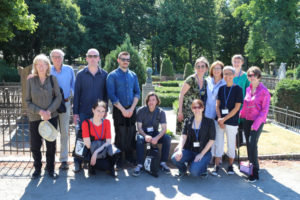On June 9, Professor of English Chris Foss presented a paper (in partial fulfillment of his Summer 2018 Faculty Research Grant) entitled As he is no longer beautiful he is no longer useful: Reading Oscar Wilde’s ‘The Happy Prince’ through the Lens of Disability Studies at the inaugural John Andrén Foundation International Conference on Oscar Wilde and Aubrey Beardsley, held in Ystad, Sweden.
Wilde’s representation of disability in “The Happy Prince” is not without its issues, particularly the possibility it ends up ascribing an exclusively pejorative status to disability if it can only be some sort of martyrdom rather than a valued form of difference that need not preclude one from leading a happy, fulfilling life. Still, with his story’s divine endorsement of the shabby blind statue and the dead bird (the latter now arguably inscribed as an ugly, useless body in his own right after his decaying remains are discarded as worthless trash), Wilde also allows for readers to arrive at a decidedly different and fundamentally positive response to disability than the still-popular view of it as some sort of divine punishment or retribution.
In this alternative take, we are encouraged to value (indeed, to privilege), to love—not just a tolerance of love for bodies society traditionally has devalued as deviant and/or discarded as dangerous, but more profoundly a celebration of the love of and by bodies embraced precisely for, rather than in spite of, their difference and diversity.
